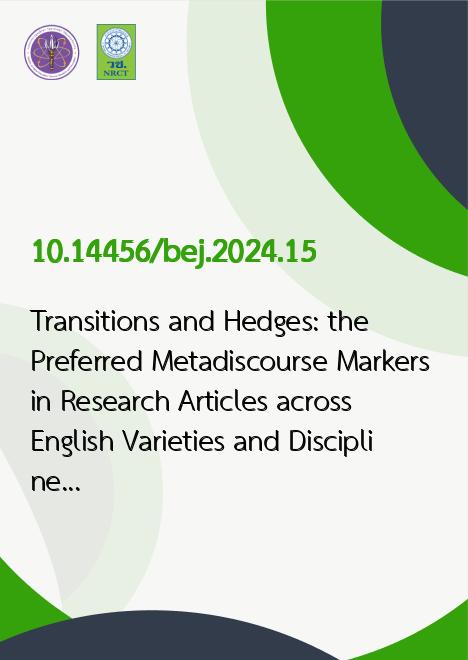
|
Transitions and Hedges: the Preferred Metadiscourse Markers in Research Articles across English Varieties and Disciplines |
|---|---|
| รหัสดีโอไอ | |
| Creator | Joy Bumanglag Gamad |
| Title | Transitions and Hedges: the Preferred Metadiscourse Markers in Research Articles across English Varieties and Disciplines |
| Contributor | Leah E. Gustilo, Nimfa G. Dimaculangan, Francisco Perlas Dumanig |
| Publisher | Ph.D. Program in English Language Teaching (ELT), Faculty of Humanities and Social Sciences, Buriram Rajabhat University |
| Publication Year | 2567 |
| Journal Title | BRU ELT JOURNAL |
| Journal Vol. | 2 |
| Journal No. | 3 |
| Page no. | 206-229 |
| Keyword | metadiscourse markers, interactive markers, cross-disciplinary MDMs, interactional markers, linguistic variations |
| URL Website | https://so14.tci-thaijo.org/index.php/bru_elt_journal/index |
| Website title | https://so14.tci-thaijo.org/index.php/bru_elt_journal/article/view/1134 |
| ISSN | 2822-1311 |
| Abstract | This study examines the use of metadiscourse markers (MDMs) in the Results, Discussion, and Conclusion sections of Research Articles (RAs) across social sciences, linguistics, and business disciplines in Philippine English, American English, and Chinese English. Analyzing 90 electronic RAs using Yang and Allison's (2003) model for moves and steps and Hyland's (2005) model for MDMs with AntConc software, the study found that transitional markers were the most common interactive markers, while hedges were the most frequent interactional markers. Significant differences in MDM usage were observed across disciplines and English varieties, with social science authors and Philippine English RAs showing higher MDM usage. Interactional MDMs varied: Chinese English authors preferred boosters (e.g., always, definitely) and hedges (e.g., could, perhaps) in social sciences, Philippine English authors in linguistics, and American English authors in business. Our study on metadiscourse markers provides cross-cultural insights, reveals disciplinary variations, compares MDM usage across English varieties, and informs targeted academic writing instruction to enhance communication in diverse settings. |